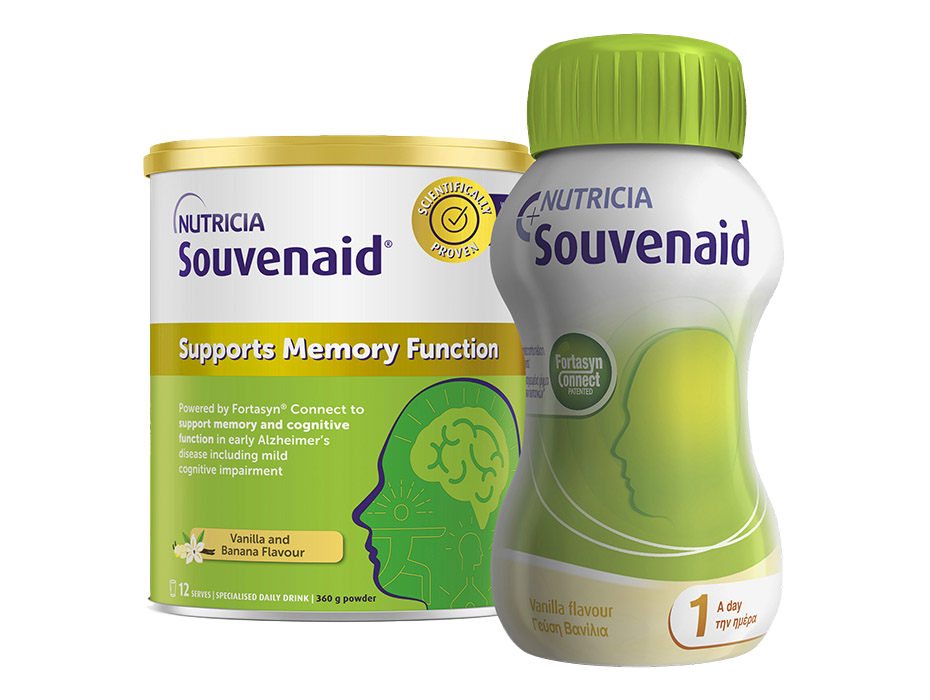Managing Mild Cognitive Impairment
If you notice memory loss becoming more frequent and increasingly disrupting day-to-day life, it is worth speaking to a healthcare professional to investigate whether it could be mild cognitive impairment (MCI), which can progress to dementia. If detected early, there is a better chance for proper management, which could help address the progression and enable you to get support if needed2.
What is Mild Cognitive Impairment?
Mild cognitive impairment may be a transition state between normal cognition and dementia.
While it’s normal to experience some memory-related issues as we age, if your memory function begins to display more frequent changes and increasingly disrupts aspects of daily life, you may want to explore whether it could be mild cognitive impairment by speaking with a healthcare professional.

What are the types of Mild Cognitive Impairment?
Two types of MCI have been identified by the medical community, known as Amnestic MCI and Non-amnestic MCI. These types of MCI differ by their symptoms, although the exact symptoms experienced can vary from person to person:
Amnestic MCI
The most common type of MCI, symptoms focus on changes to memory and thinking skills. Previous skills in recalling important events and information may be impaired, resulting in forgotten appointments or conversations. Even recent events may be forgotten by those with Amnestic MCI, indicating issues with short-term memory.
Non-amnestic MCI
For those diagnosed with non-amnestic MCI, symptoms focus less on memory, and more on thinking skills. It may be harder to focus, language and decision-making may be more difficult, and visual perception may change.
Souvenaid is a food for special medical purposes and must be used under medical supervision. Souvenaid does not cure or alleviate Alzheimer’s disease. Nothing in this article is to be substituted for medical advice, always consult your medical professional for any health concerns.
Mild Cognitive Impairment Symptoms
It is currently estimated that people with MCI have a 3 to 5 times increased risk of developing dementia within the next 10 years compared with other people their age3. Since many with MCI still maintain the ability to independently perform most activities required for daily living, it’s easy to disregard any symptoms as simply a normal part of ageing. Ignoring symptoms may prevent many from receiving a diagnosis and the chance to manage its progression. Some signs may be normal to experience, so it is always best to consult with a healthcare professional.
Risk factors for Mild Cognitive Impairment
Certain risk factors may raise your likelihood of developing MCI.
Experts do not currently understand the exact cause of MCI, however they have recognised that some factors may increase the risk:
- Ageing
- A history of neurodegenerative disease in the family
- Lifestyle factors, such as sedentary behaviour, smoking and infrequent social stimulation
- Having conditions that increase your risk of cardiovascular disease, such as high blood pressure, high cholesterol levels, diabetes, and obesity
How is Mild Cognitive Impairment diagnosed?
For some people, diagnosis is encouraged by family and friends noticing the rise of certain symptoms. When memory problems persist, the affected individual may feel prompted to visit a doctor or specialist about their issues, leading to testing for cognitive impairment.
There is no one single test that can be performed to diagnose mild cognitive impairment, depending on symptoms, a doctor may consider a variety of tests. This may include:
- Medical history, including family history of memory problems or dementia.
- History of cognitive concern, including patient and family perspectives if possible.
- Cognitive assessments, such as thinking and memory tests.
- Neurological testing to determine the function of nerves, reflexes, coordination, movement, senses, and balance.
- Blood tests, to rule out other causes of cognitive decline, or to assess certain biomarkers.
- Brain structure imaging, for example a computerised tomography (CT) scan, magnetic resonance imaging (MRI) scan or positron emission tomography (PET) scan.
- A spinal fluid test, to detect if there is amyloid beta protein, which is found in Alzheimer’s disease associated amyloid plaques.
Souvenaid is a food for special medical purposes and must be used under medical supervision. Souvenaid does not cure or alleviate Alzheimer’s disease. Nothing in this article is to be substituted for medical advice, always consult your medical professional for any health concerns.
Early diagnosis and management of Mild Cognitive Impairment can help to better manage its progression.
To help manage MCI, a healthcare professional may recommend lifestyle and diet changes such as:
- BRAIN TRAINING
Exercising your mind and memory with puzzles, quizzes, etc. - SOCIAL ENGAGEMENT
Making an effort to keep going out to see friends and family. - NUTRITION
Maintain a healthy, balanced, Mediterranean-style diet. - PHYSICAL EXERCISE
Getting regular physical exercise for at least 30 minutes on most days - OVERALL HEALTH
Including managing high blood pressure and/or cholesterol and ceasing smoking

How Souvenaid® can help support memory function
Souvenaid® is a medical drink backed by 20 years of evidence-based research. It contains a unique combination of nutrients formulated to support the growth of brain connections at levels that are difficult to attain through diet alone.
Souvenaid® is proven to slow memory and cognitive decline by 60% in an early stage of Alzheimer’s disease called mild cognitive impairment when taken daily over 3 years4
Souvenaid is a food for special medical purposes for the dietary management of early Alzheimer’s disease and must be used under medical supervision.
Souvenaid does not cure or alleviate Alzheimer’s disease. Nothing in this article is to be substituted for medical advice, always consult your medical professional for any health concerns.
Can You Live Independently with Mild Cognitive Impairment?
A key clinical feature of MCI is that people have preserved daily functioning, compared with more severe forms of cognitive issues or diseases where this is not the case. The majority of those diagnosed with MCI can live independently, and will continue to have daily functioning despite their cognitive impairment. Some people with MCI may find they complete tasks slower than usual, or make occasional mistakes whilst performing everyday tasks, but this is not expected to impact an individuals ability to maintain independence.
MCI can affect people differently, and whether MCI will worsen, improve or stabilise depends on the cause, and management of the condition. Those with MCI will require regular medical check-ups to assess how things are going, and ensure the person with MCI has the support required, which is personal to each individual.
Recent Australian recommendations on the detection, assessment, and management of mild cognitive impairment5 recommend a personalised approach to MCI management, considering whether a plan of care or other health care professional involvement is required. Always consult your healthcare professional for any medical advice.
It’s never an easy conversation, so here are some tips to get started:
Educating yourself on the signs and symptoms and observing your loved one will help you decide if there is cause for concern, and a reason for them to speak to their medical professional. Remember not to jump to any conclusions. It can be difficult to define how much memory impairment is considered ‘more than normal’. Your aim is to get them talking to a medical professional, not to diagnose anything yourself.
For additional support or information, you can reach out to the Dementia Australia Helpline, 1800 100 500, a 24-hour point of contact for people with any concerns about their own or a loved one’s cognition, or speak to your healthcare professional.
Your loved one may not want to discuss their memory changes or may be unaware themselves. Prepare by having a plan for the discussion, being ready for negative reactions, and having some next steps to discuss.
Ensure your loved one feels safe and comfortable to have the conversation. A setting that feels like ‘home turf’ to them, and ideally you too, can help ensure you both feel at ease enough to get through the hard parts of the conversation.
It’s important to speak to what you have noticed, and to the impact you have observed their memory loss having on their life. Remember you’re not diagnosing; you’re sharing your point of view as someone who cares about them.
They might be impatient, frustrated or even scared when you start discussing their memory loss. Remain positive and ensure you don’t push back – their point of view is as valid as yours. This could be a life-changing realisation for them, and they may need time to process it. Bring a positive outlook and remember that acting on your concerns by having the conversation comes from a place of love and support.
The next step is for your loved one to see their healthcare professional to get an assessment to investigate their symptoms and any support and management plans they might need. It can be helpful to attend this appointment together as you can both provide the GP with information that can help them understand what has been happening.
Talking to a GP Together
There are a few simple things to keep in mind so you can both get the most out of the visit.
Allow enough time to thoroughly discuss both of your concerns. Let your loved one lead the conversation and offer support where you can.
Bring a thorough list of your concerns from your loved one and yourself, the signs of memory loss you have noticed, and any other medical details or background a GP might need to know about your loved one.
Don’t be afraid to ask questions and remember to take notes – this is their chance to start to understand what may be happening, and what can be done.
There is no single test for MCI, and it can be difficult to make a diagnosis early on. A doctor may ask for additional tests to be conducted, such as blood or cognitive function tests to better inform their assessment. They may refer your loved one to a specialist like a geriatrician, psychiatrist, neurologist, or neuropsychologist.
Remember not to jump to conclusions before your appointment or to cause any alarm. There are many reasons for memory-related issues. The GP will be your best resource for information about what is happening, what it could mean, and what happens next.
Finding out that a loved one has MCI can leave you both with many emotions. For some people, it can be upsetting or may come as a shock. For others, it can be confirmation of something they’ve long suspected. Make sure you create space for these feelings, use the emotional support networks you have, and speak to your GP about support they can help you access.
References:
- Woodward M. MedicineToday 2022; 23(12): 55-59
- Mild Cognitive Impairment, Dementia Australia. Available at: https://www.dementia.org.au/about-dementia-and-memory-loss/about-dementia/memory-loss/mild-cognitive-impairment (Accessed: 19 September 2023)
- Campbell N et al. Risk Factors for the Progression of Mild Cognitive Impariment Impairment to Dementia. 2013. Available at https://www.ncbi.nlm.nih.gov/pmc/articles/PMC5915285/ (Accessed: 19 September 2023)
- Soininen H et al. Alzheimer’s Dement. 2020; 1–12
- Woodward M, et al. J Alzheimers Dis. 2022;89(3):803-809
Souvenaid is a food for special medical purposes and must be used under medical supervision. Souvenaid does not cure or alleviate Alzheimer’s disease. Nothing in this article is to be substituted for medical advice, always consult your medical professional for any health concerns.


